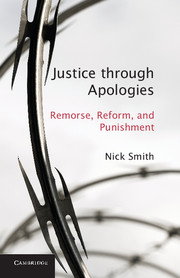3 - Apology Reductions in Criminal Law
Published online by Cambridge University Press: 05 June 2014
Summary
But if he has done wrong, then he must, if he really wills one thing and sincerely wills the Good, desire to be punished, that the punishment may heal him just as medicine heals the sick.
KierkegaardIt is precisely among criminals and convicts that the sting of conscience is extremely rare; prisons and penitentiaries are not the kind of hotbed in which this species of gnawing worm is likely to flourish: all conscientious observers are agreed on that, in many cases unwillingly enough and contrary to their own inclinations. Generally speaking, punishment makes men hard and cold; it concentrates; it sharpens the feeling of alienation; it strengthens the power of resistance. If it happens that punishment destroys the vital energy and brings about a miserable prostration and self-abasement, such a result is even less pleasant than the usual effects of punishment – characterized by dry and gloomy seriousness.
Nietzsche, Genealogy of MoralsIntroduction
U.S. Court of Appeals Judge Richard Lowell Nygaard makes explicit what many justices only imply: “Repentance and correction are the real, albeit unacknowledged, often unexpressed hopes of sentencing.” Throughout my work in these areas I have been struck, time and again, by the fact that state agents rendered determinations regarding remorsefulness or remorselessness for more than seven million offenders in the contemporary U.S. criminal justice system. They often made these determinations informally, never mentioning that remorse played a role. They rarely explain or defend the relevance of apologies to punishment. I find it staggering: millions of offenders, millions of state agents with diverse views, an infinite variety of contexts, and hardly any guidance on the proper relationship between apologies and punishment. The words from Beebe's judge cited in the introduction – “Is he remorseful? I think so” – haunt this book.
- Type
- Chapter
- Information
- Justice through ApologiesRemorse, Reform, and Punishment, pp. 94 - 240Publisher: Cambridge University PressPrint publication year: 2014



